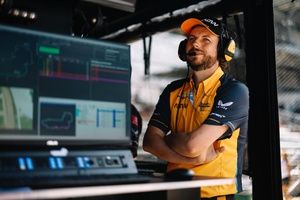Q & A with Peter Sauber
Conducted and provided by Sauber's press office.

Conducted and provided by Sauber's press office.
Q. At the end of the day, how would you assess the season?
Peter Sauber:
I think that, on balance, it's been a very successful one. Just like the year before, we've achieved sixth place in the Constructors' Championship, yet in terms of performance we did manage to take a big step forward. In 2003, we merely scored 19 points, and as many as ten of them were the result of the rain race at Indy. This year, we clinched 34 points, and we've earned all of them on account of our own performance. Today, we're in a much stronger position than one year ago. Of particular importance, though, is the fact that our performance curve was continually pointing upwards during the course of the season. Now, we want to take this momentum with us into the upcoming year.
Q. Do you attribute this progress strictly to the wind tunnel?
PS:
It would probably be wrong to say that we owe this progress strictly to the wind tunnel, although it is, no doubt, the most important factor. After launching the facility in March, we continuously made great strides. To be honest, though, the speed at which we were able to reap these benefits even came as a surprise to ourselves. I'm already looking forward to the new C24, which will be the first Sauber racing car to be developed completely in the new wind tunnel.
Q. Formula One is dominated by the manufacturers' teams. How do you view the future of Sauber Petronas?
PS:
The presence of seven global car manufacturers has caused budgets to virtually explode in recent years, and - needless to say - this doesn't make things any easier for the independent teams. We're working with a limited budget that's not simply 'beefed up' by an automotive corporation. Nevertheless, as an independent team, Sauber Petronas have been able to stand their ground very well. This season we managed - yet again - to finish ahead of the works teams of the world's second- and third-largest automotive manufacturers, Toyota and Ford, and - what's more - with a clearly stronger lead than before. In the event that cost reduction steps as a result of changes in regulations should be forthcoming within the foreseeable future, this would increase our competitiveness even further, because we're accustomed to making highly efficient use of our resources.
Q. How do you assess the performance of your two drivers?
PS:
I'm very satisfied with both of our drivers. Giancarlo delivered exactly what we'd expected of him. He's quick, consistent and makes few mistakes. Felipe, as well, has a very good basic speed and has clearly improved in terms of consistency during the course of the season. When it comes to overtaking, he's an exceptional talent. There's hardly another driver who overtook as many rivals as Felipe did this season. He's a fighter, and I'm convinced that he'll be delighting us a lot next year. By the way: one of the major reasons why other team principals suddenly developed an interest in Giancarlo is the fact that we gave him a quick car. I wish him all the best for the future. And who knows, perhaps his eyes will be wandering across to the Sauber Petronas pits with a bit of a wistful look now and then.
Q. And next year Jacques Villeneuve will be competing for you. After contesting his first Grands Prix for Renault there were voices saying that your decision had been premature.
PS:
For me, none of this came as a surprise, and I'd pointed this out to Jacques in our preliminary discussions. His comeback was exactly as I'd expected it to be. It's only normal that a Formula 1 driver - after a year of absence and in a new team at that - needs a certain number of kilometres both in test and race conditions before he's able to deliver his full performance. I'm not worried, though: Jacques will be in top shape for our winter tests already, and I'm looking forward to a successful cooperation with him.
Q. What are Sauber Petronas still lacking to become a top team?
PS:
The major difference between Sauber Petronas and the top teams is the financial resources, and this - above all - translates into clearly less test kilometres and hours of wind tunnel work for us. But - considering the pit stops during the past season and the reliability of our cars for example - we are among the best already in these particular disciplines. And when it comes to pure speed, we've clearly improved as well. Especially in the races, our performance was often up to par with BMW-Williams or McLaren-Mercedes. We're compensating our financial disadvantages by sound organisation and high levels of efficiency. The budgets of our competitors don't keep us from pursuing forward-looking goals.
Q. How far have you progressed with the development of the new car?
PS:
We're exactly on schedule with the C24. The development of the new gear box has already progressed very far. In addition, we're performing intensive wind tunnel work to compensate for the new aerodynamic restrictions as much as possible. This much I can tell you already: what I've seen so far makes me feel confident indeed!
Be part of the Autosport community
Join the conversationShare Or Save This Story
Subscribe and access Autosport.com with your ad-blocker.
From Formula 1 to MotoGP we report straight from the paddock because we love our sport, just like you. In order to keep delivering our expert journalism, our website uses advertising. Still, we want to give you the opportunity to enjoy an ad-free and tracker-free website and to continue using your adblocker.


















Top Comments